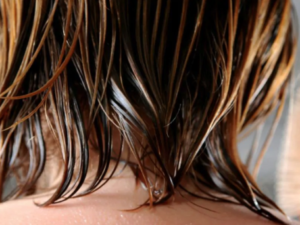Swimming is an excellent way to stay fit and healthy. However, frequent exposure to chlorinated water and other pool chemicals can take a toll on your hair. Swimmers often face unique challenges when it comes to hair care, including dryness, breakage, and hair loss. Understanding the causes of hair loss in swimmers and adopting effective prevention and treatment strategies can help you maintain healthy, strong hair while enjoying your time in the pool.
Understanding Hair Loss in Swimmers
Causes of Hair Loss
Several factors contribute to hair loss in swimmers, including:
- Chlorine and Chemicals: Chlorine and other chemicals used to maintain pool hygiene can strip the hair of its natural oils, leading to dryness, brittleness, and breakage.
- Saltwater Exposure: Saltwater, although less harsh than chlorine, can also dehydrate the hair and scalp, causing similar damage.
- Friction and Tension: Wearing tight swim caps and the repetitive friction caused by swimming can weaken hair strands and lead to breakage.
- Frequent Washing: Swimmers often wash their hair more frequently to remove chlorine and other chemicals, which can strip the hair of essential oils and moisture.
Prevention Strategies
Use a Swim Cap
Wearing a swim cap is one of the most effective ways to protect your hair from chlorine and saltwater. Choose a cap made from silicone or latex, as these materials provide a better seal and reduce water exposure.
Pre-Swim Hair Care
Preparing your hair before swimming can minimize damage:
- Rinse with Fresh Water: Wet your hair with fresh water before entering the pool. This helps reduce the amount of chlorinated water your hair absorbs.
- Apply a Protective Product: Use a leave-in conditioner or a protective oil, such as coconut or argan oil, to create a barrier between your hair and the pool water.
- Braid Your Hair: Braiding your hair can reduce friction and tangling while swimming.
- Use a Swim-Specific Hair Product: Some products are specifically designed for swimmers to protect and strengthen hair before and after exposure to pool water.
- Avoid Tight Hairstyles: Loosely secure your hair to prevent breakage and reduce tension on the hair follicles.
Post-Swim Hair Care
Proper post-swim hair care is crucial to prevent damage and maintain healthy hair:
- Rinse Immediately: Rinse your hair with fresh water as soon as you exit the pool to remove chlorine and other chemicals.
- Use a Clarifying Shampoo: Use a clarifying shampoo once a week to remove any residual chlorine and buildup from your hair.
- Condition Regularly: Apply a deep conditioner or hair mask to replenish moisture and nutrients lost during swimming.
- Avoid Heat Styling: Let your hair air dry instead of using heat tools to prevent additional damage.
- Detangle Gently: Use a wide-tooth comb to gently detangle your hair while it’s still wet, starting from the ends and working your way up.
- Apply Leave-In Conditioner: Use a leave-in conditioner to help restore moisture and protect your hair from further damage.
- Use a Microfiber Towel: Dry your hair with a microfiber towel to reduce friction and prevent breakage.
- Trim Regularly: Get regular trims to remove split ends and maintain healthy hair.
Treatment Options
Hydration and Nourishment
Keeping your hair hydrated and nourished is essential for preventing hair loss:
- Moisturizing Products: Use moisturizing shampoos, conditioners, and leave-in treatments designed to hydrate and strengthen hair.
- Hair Masks: Incorporate hydrating hair masks into your routine to provide deep conditioning and repair damaged hair.
Diet and Lifestyle
Balanced Diet
A balanced diet rich in essential nutrients supports healthy hair growth. Here are some key components to include in your diet for optimal hair health:
- Protein: Protein is a building block for hair, as hair is primarily made up of a protein called keratin. Include sources like:
- Lean meats (chicken, turkey, beef)
- Fish (salmon, mackerel, tuna)
- Eggs
- Legumes (beans, lentils, chickpeas)
- Dairy products (milk, cheese, yogurt)
- Plant-based proteins (tofu, tempeh, quinoa)
- Vitamins and Minerals: Ensure you’re getting enough of these essential vitamins and minerals:
- Vitamin A: Promotes healthy sebum production in the scalp. Sources include carrots, sweet potatoes, spinach, and kale.
- Vitamin C: Helps in collagen production, which strengthens hair. Found in citrus fruits, strawberries, bell peppers, and broccoli.
- B-Complex Vitamins: B vitamins, especially biotin (B7), are crucial for hair growth. Sources include whole grains, almonds, meat, fish, and leafy greens.
- Antioxidants: Protect hair follicles from oxidative stress. Include foods rich in antioxidants, such as:
- Blueberries
- Raspberries
- Pecans
- Dark chocolate
- Artichokes
Stay Hydrated
Proper hydration is essential for maintaining healthy hair and scalp. Water plays a crucial role in various bodily functions, including hair growth. Here are some statistical facts to highlight the importance of staying hydrated:
- Hair Composition: Hair strands are composed of approximately 25% water. Keeping your body hydrated ensures that your hair remains strong and healthy.
- Water Consumption and Hair Growth: Studies have shown that adequate water intake can support hair growth. The recommended daily water intake is about 15.5 cups for men and 11.5 cups for women, but this can vary depending on individual needs and activity levels.
Professional Treatments
If you are experiencing significant hair loss or damage, consulting a hair replacement specialist is crucial. Professional treatments can offer targeted solutions to address hair loss and promote healthy hair growth. Here are some options to consider:
Hair Restoration Procedures
For severe hair loss, more advanced procedures might be necessary. These can include:
- PRP (Platelet-Rich Plasma) Therapy: This involves injecting platelet-rich plasma into the scalp to stimulate hair growth and improve follicle health. PRP is derived from your own blood and is known for its regenerative properties.
- Hair Transplantation: This surgical procedure involves moving hair follicles from a donor area (usually the back or sides of the head) to areas experiencing hair loss. There are two main types of hair transplants:
- FUE (Follicular Unit Extraction): Individual hair follicles are extracted and transplanted.
- FUT (Follicular Unit Transplantation): A strip of scalp with healthy hair follicles is removed and transplanted.
Extensions and Wigs
For those looking for immediate solutions to enhance the appearance of their hair, extensions and wigs can be an excellent choice:
- Hair Extensions: High-quality hair extensions can add length and volume to your natural hair. They can be made from human hair or synthetic materials and come in various application methods such as tape-ins, clip-ins, and sew-ins. It’s important to have extensions applied and maintained by a professional to prevent damage to your natural hair.
- Wigs: Modern human hair wigs can look incredibly natural and provide a full head of hair instantly. Wigs come in various styles, colors, and materials (human hair or synthetic). Custom wigs tailored to your head size and shape offer the best fit and comfort.
Hair Systems
Hair systems are another option for those experiencing hair loss. These systems can be custom-made to match your hair color, texture, and density, providing a natural look. Hair systems are non-surgical and can be attached using various methods, including adhesives and clips. Regular maintenance and professional fitting are essential for a seamless appearance and comfort.
In Summary
Swimming is a fantastic exercise, but it does come with some hair care challenges. By understanding the causes of hair loss in swimmers and implementing preventive measures, you can enjoy swimming while maintaining healthy, strong hair. If you experience significant hair loss or damage, consult a hair replacement specialist for personalized treatment options.
Contact Us for Baltimore Hair Loss Services
For expert advice and professional treatments, contact Eldorado Hair Restoration and Replacement Center. Our experienced hair loss specialists can help you address hair loss, improve hair health, and provide tailored solutions to meet your needs. Reach out to us today to schedule a consultation and take the first step towards healthier hair.





